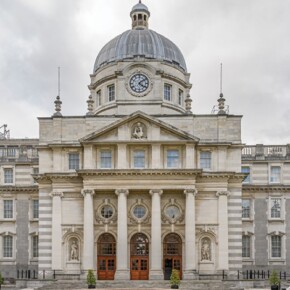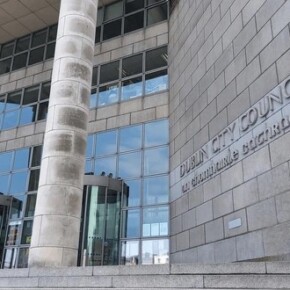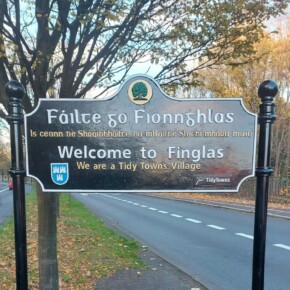South Dublin County Council calls for nationwide ban on new data centres
Mike Finnerty 17 Sep 2025
South Dublin County Council has passed a motion calling for data centres to be banned outright in Ireland.
Earlier this year, figures from the Central Statistics Office found that data centres used up 22% of Ireland’s electricity supply in 2024, a jump from the 5% figure in 2015.
The AI boom, as well as the prominence of smart speakers in Irish homes, means that data centres are required to store the data; this has the impact of making electricity costs higher for consumers, and meaning that Ireland is less likely to hit its legally-binding climate targets.
At this week’s meeting of South Dublin County Council, a motion proposed by People Before Profit councillor Jess Spear saw the council agree on a moratorium on any new data centres being built in Ireland, and they will write to the Minister for the Environment calling for their suggestion to be implemented.
Spear said, “every action taken by governments will determine whether climate change gets worse or we take the necessary steps to get off fossil fuels, reduce the impact on nature, and improve the lives for the vast majority of people on the planet. All the indications suggest this government is not going to take climate change seriously, and none more than their approach towards data centres.”
The Tallaght councillor said “either you treat climate change and housing as emergencies or you don’t.”
“In an emergency, you have to cut what you don’t need. We don’t need targeted advertisements. We don’t need a massive expansion of AI.”
Spear remarked, “the government can say ‘we don’t have to choose between housing and data centres’ all they want, but the maths say otherwise.”
Independent councillor Helen Farrell added an amendment to the motion, saying that the government should ban the building of any further data centres unless they are able to be run by 100% renewable energy sources such as solar, wind or wave energy.
The Lucan councillor said that her amendment would help push forward green energy in Ireland and balance the needs of both the economy and the environment.
“Given the turbulent political and economic times that we find ourselves in, we should not be looking to exclude businesses, but it should also not be at the expense of our environment.”
Independent councillor Alan Edge said that data centres are having a “corrosive” effect, and he has outstanding concerns about AI.
The Firhouse–Bohernabreena councillor noted that he and fellow independent councillors Francis Timmons and Madeleine Johansson had lobbied South Dublin County Council about the county development plan and the banning of data centres, but said they were “slapped down” by the office of the planning regulator.
“I see that as an unjustified and unwarranted instruction on our functions,” he said, and backed Spear’s motion instead of Farrell’s amendment.
Labour councillor Paddy Cosgrave said that the council should be taking advantage of the local geography to build more wind farms to offset the environmental impact of data centres, saying that the hills of South Dublin should be used to generate more wind energy.
Independent Ireland councillor Linda De Courcy said that renewable energy is “not reliable” and that technology for wind farms is “not recyclable,” claiming that solar and wind farms are just as environmentally impactful as data centres.
“We need electricity and we need to feed ourselves; I’m concerned about this obsession with having more solar panels and wind farms on arable land,” but she still backed the ban on data centres, as it reduces electricity costs.
Fine Gael councillor David McManus said, “data centres aren’t just being built for the sake of it; they pay for their electricity and pay significant commercial rates,” noting that €20 million a year is generated locally as a result of the taxes and rates imposed on data centres.
McManus noted that data centres also disperse surplus heating to the likes of South Dublin County Council buildings, TU Dublin, as well as local houses.
Labour councillor and South Dublin County Council Mayor Pamela Kearns said that pragmatism was needed on the data centre debate, arguing that Farrell’s amendment was the better option instead of the outright ban that was proposed by People Before Profit.
Social Democrats councillor Eoin Ó Broin backed the People Before Profit motion, saying “until Ireland has a lot of wind turbines in the Irish Sea or the Atlantic Ocean, we won’t have room for the expansion needed. I think we’ve done our bit for the globe and the digital revolution with the amount of data centres we have per capita in Ireland.”
Independent councillor Liona O’Toole said, “it’s the future and we have to embrace it, but this motion addresses the impact of it.”
Spear’s motion passed by 21 votes to 15.
Earlier this year, former South Dublin County Council member turned TD Ciáran Ahern called on Minister For The Environment Darragh O’Brien to “get the finger out” with regard to the climate crisis.
In July, the Labour TD said “it’s nowhere near good enough for the government to simply ‘encourage’ sustainable energy use by data centres.”
“We’re talking about the infrastructure that already accounts for more than one-fifth of electricity consumption in Ireland, and this is only going to grow to 30% in the next few years.”
“Minister O’Brien needs to wake up and realise that he is responsible for not only ensuring the protection of our planet, but also the protection of people’s pockets when it comes to the cost of energy bills.”
This week, Energia and Bord Gáis announced they were raising prices for customers, adding to the sense that the cost-of-living crisis, which began in early 2022, is not going away anytime soon.
Data from Met Éireann said that summer 2025 was provisionally the warmest on record in Ireland.
Ireland has already had a front-row seat to the effects of climate change with January’s Storm Éowyn, with research from Met Éireann finding that damaging storms such as Éowyn were now more likely as a result of climate change.
Research from Friends Of The Earth found that Clondalkin alone hosts a quarter of the data centres in Ireland.
In 2024, Friends of the Earth commissioned research written by Professor Hannah Daly, which showed how data centre demand had outpaced all the new renewable wind energy that had come on stream in Ireland between 2017 and 2023.
Speaking last week, Green leader Roderic O’Gorman accused his former government colleagues of “ripping up” any environmental progress made during the Greens’ time in government between 2020 and 2025.
O’Gorman accused the government of “trying to rip up and roll back the initiatives and policies the Green Party introduced during the last government,” and said that the government was not taking climate-related issues seriously.
In April of this year, the International Energy Agency said that by 2030, the amount of electricity used by data centres will be double what it is now, owing to the likes of ChatGPT becoming more ubiquitous.











